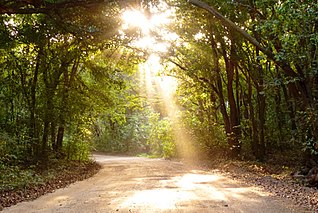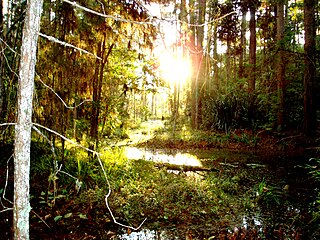 W
WA national forest in Brazil is a type of sustainable use protected area. The primary purpose is sustainable exploitation of the forest, subject to various limits. These include a requirement to preserve at least 50% of the original forest, to preserve forest along watercourses and on steep slopes, and so on. More than 10% of the Amazon rainforest is protected by national forests or other types of conservation unit.
 W
WA list of Brazilian National Forests follows. According to the Brazilian National System of Conservation Units, a national forest of Brazil is an area with forest cover of predominantly native species that has as its basic objective the multiple sustainable use of the forest resources and scientific research, with emphasis on methods of sustainable exploitation of native forests.
 W
WThe Açu National Forest is a national forest in the state of Rio Grande do Norte, Brazil.
 W
WAltamira National Forest is a national forest in the state of Pará Brazil.
 W
WAmaná National Forest is a national forest in the state of Pará, Brazil. Most of it has been allocated for use in sustainable forestry or community forestry. Mining is allowed.
 W
WThe Amapá National Forest is a national forest in the state of Amapá, Brazil. It supports sustainable exploitation of the natural resources in an area of Amazon rainforest in the Guiana Shield.
 W
WThe Amazonas National Forest is a national forest in the state of Amazonas, Brazil.
 W
WThe Aripuanã National Forest is a national forest in the state of Amazonas, Brazil. It supports sustainable forestry, and also protects the environment, supports scientific research and protects the sustainable lifestyle of the traditional inhabitants of the forest.
 W
WThe Bom Futuro National Forest is a national forest in the state of Rondônia, Brazil. The forest has been subject to a massive invasion of loggers, ranchers and farmers.
 W
WThe Carajás National Forest is a national forest in the state of Pará, Brazil. It covers the Serra dos Carajás, an area with large deposits of iron ore, and attempts to combine the roles of supporting mineral extraction with preserving the environment and maintaining biodiversity.
 W
WCaxiuanã National Forest is a national forest located in lower Amazon region the state of Pará in the North Region of Brazil. It is located on the west banks of the Baía de Caxiuanã between the Xingu River and downstream from the Anapu River. The forest is located southeast of the Ilha do Marajó. Caxiuanã National Forest covers two municipalities in Pará, Portel and Melgaço, but the forest itself is sparsely inhabited. It is located 400 kilometres (250 mi) from the state capitol of Belém.
 W
WThe Crepori National Forest is a national forest in the state of Pará, Brazil. The forest allows sustainable use of natural resources, and mining. It is home to rich biodiversity including several endangered animal species.
 W
WThe Goytacazes National Forest is a national forest in the state of Espírito Santo, Brazil.
 W
WIquiri National Forest is a national forest in the state of Amazonas, Brazil. It is a sustainable use conservation unit, so harvesting of forest resources such as timber is allowed in accordance with a management plan.
 W
WItaituba I National Forest is a national forest in the state of Pará, Brazil.
 W
WItaituba II National Forest is a national forest in the state of Pará, Brazil.
 W
WThe Jacundá National Forest is a sustainable-use national forest in the state of Rondônia, Brazil.
 W
WThe Jamanxim National Forest is a national forest created in 2006 in the state of Pará, Brazil. The purpose is to ensure sustainable use of forest resources. The forest contains a sizeable population of settlers without land titles, and informal forest clearing and burning was continuing two years after the national forest had been created. Disputes over the legality of the forest creation were continuing in 2015.
 W
WThe Lorena National Forest is a national forest in the state of São Paulo, Brazil. It protects a relatively small fragment of Atlantic Forest.
 W
WThe Macauã National Forest (Portuguese: Floresta Nacional do Macauã is a national forest in the state of Acre, Brazil.
 W
WThe Mapiá-Inauini National Forest is a national forest in the state of Amazonas, Brazil.
 W
WMulata National Forest is a national forest in the state of Pará, Brazil.
 W
WNísia Floresta National Forest is a national forest in the state of Rio Grande do Norte, Brazil.
 W
WThe Pacotuba National Forest is a national forest in the state of Espírito Santo, Brazil.
 W
WThe Passa Quatro National Forest is a national forest in the state of Minas Gerais, Brazil. It contains an area of Atlantic Forest.
 W
WThe Pau-Rosa National Forest is a national forest in the state of Amazonas, Brazil.
 W
WThe Purus National Forest is a national forest in the state of Amazonas, Brazil. It surrounds the shamanic-Christian community of Céu do Mapiá.
 W
WThe Restinga de Cabedelo National Forest is a national forest in the state of Paraíba, Brazil.
 W
WThe Rio Preto National Forest is a national forest in the state of Espírito Santo, Brazil.
 W
WRitápolis National Forest is a national forest in the state of Minas Gerais, Brazil.
 W
WThe Roraima National Forest is a national forest in the state of Roraima, Brazil.
 W
WThe Santa Rosa do Purus National Forest is a national forest in the state of Acre, Brazil.
 W
WThe São Francisco de Paula National Forest is a national forest in the state of Rio Grande do Sul, Brazil.
 W
WThe São Francisco National Forest is a National forest in the state of Acre, Brazil.
 W
WThe Saracá-Taquera National Forest is a national forest in the state of Pará, Brazil.
 W
WThe Tapajós National Forest is a Brazilian national forest in the state of Pará, Brazil. It supports sustainable exploitation of the natural resources in an area of Amazon rainforest.
 W
WTapirapé-Aquiri National Forest is a national forest in the state of Pará, Brazil. It is surrounded by other protected areas, so has suffered relatively little from deforestation.
 W
WThe Tefé National Forest is a national forest in Amazonas, Brazil. It protects a relatively well-preserved area of Amazon rainforest to the south of the town of Tefé on the Solimões River . The resident population, scattered in small communities along the rivers, are engaged in sustainable farming, fishing and extraction of forest products.
 W
WTrairão National Forest is a national forest in the state of Pará, Brazil. It contains a large area of Amazon rainforest with high biodiversity. It is a sustainable use conservation unit in which logging is allowed subject to a management plan, and was created in an effort to curb illegal deforestation in the area.
 W
WThe National Forest of Três Barras is a Federal Conservation Unit of sustainable use, managed by the Chico Mendes Institute for Biodiversity Conservation - ICMBio, in the municipality of Três Barras, Santa Catarina, Brazil.
 W
WUrupadi National Forest is a national forest (Brazil) in the state of Amazonas, Brazil.